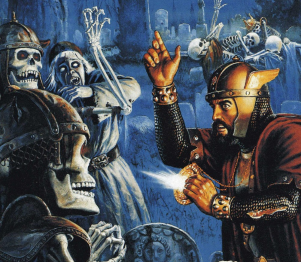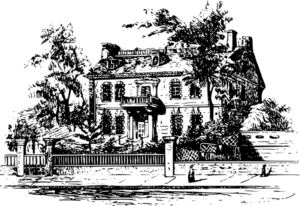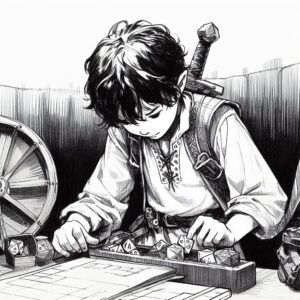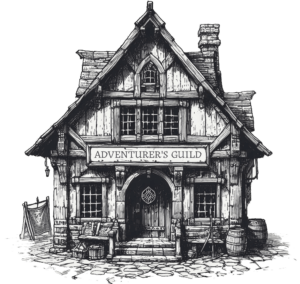The stone swallowed the sound of their footfalls.
With every step down the ancient spiral stair, the air grew colder, heavier. It was not the chill of night or storm, but the suffocating press of deep time—the kind that settles into bone and memory. The light from Aelinthir’s staff danced along stone that was too smooth, too perfect. Mortarless joints. No tool marks. No seams. The walls gleamed with a subtle iridescence when viewed from certain angles, as though capturing light that wasn’t there.
Even the magic in Aelinthir’s staff seemed pale, sickly in the presence of such stone. As if light itself struggled to survive here.
Durim ran a hand along the wall, his fingers reverent, almost afraid. His dwarven heritage had taught him to read stone like others read books—every imperfection, every grain, every subtle variation speaking volumes about its creation.
“This isn’t dwarf-work,” he said at last, his voice hushed with a mixture of professional awe and primal dread. “This isn’t even post-Sundering. It’s older. Before nations. Before names.” He tapped the surface with a knuckle, listening to the strange, muted resonance. “This tower wasn’t carved. It was placed.”
Kaelen frowned, his weathered face darkening in the ghostly light. “By what?”
The dwarf didn’t answer. Some questions were better left unvoiced in such places.
The spiral emptied into what had once been the upper chamber of a bell tower—now sunken into the earth, entombed by centuries. The crypt above had been nothing but a shell—a mask laid over a forgotten monument. The real structure lay below, buried by earth and intent.
And yet it had not fallen.
The tower was intact. The air held still, as if preserved by something that refused to decay. It tasted metallic, almost sweet—like blood without the iron.
They descended along a tilted stone causeway—the sloped inner roof of the old tower—its walls still wrapped in architectural symbols long since erased from modern craft. The glyphs seemed to swim before their eyes, refusing to be properly seen or remembered. Pipes of smooth metal protruded like bones from the stone, neither rusted nor tarnished despite their obvious age. Some emitted a faint vibration, as though liquid still moved within them, pulsing with an unseen heartbeat.
“Look at these markings,” Aelinthir whispered, her elven eyes catching details the others missed. “They’re mathematical in nature, but the formulas… they describe spaces that cannot exist.”
None of it was familiar. All of it was deliberately hidden.
The slope ended at a sealed door—iron, featureless, perfectly fitted into the surrounding stone. No hinges. No handle. Its surface bore fine etchings that resembled circuitry more than ornamentation, forming patterns that hurt the eyes if studied too closely.
Kaelen gripped his axe tighter. “We should turn back.”
“This is what we came for,” Aelinthir replied, though her voice trembled slightly. She touched the door with her staff. There was a hiss—not of steam, but of breath—and the door sank silently into the floor, as though the stone itself had liquefied to receive it.
The stench hit them first—antiseptic and wrong, like flowers left too long in stagnant water. Thimara recoiled, a low hiss escaping her throat.
They entered a square chamber of unlit stone and surgical metal. Preserved not by time but by purpose, the chamber seemed untouched by the centuries pressing down above it. Whatever enchantment or technology had kept this place intact, it defied the natural order of decay.
The room was cold. Not the chill of death, but the kind found in abandoned places where terrible things were done in silence. A coldness that seemed to radiate not from the air but from the purpose of the place itself.
It was a preparation room.
Instruments of precise cruelty lined one wall—serrated knives with shifting runes, metal tubes that pulsed with lingering purpose. The opposite wall bore hooks hung with coils of dried, translucent tubing and a row of ceramic jars labeled in an unreadable language. Each jar sealed with black wax bearing the same sigil: a spiral inside an eye. Some jars moved slightly, as though their contents remained somehow animate.
One jar in particular stood apart from the others, its contents emitting a faint, pulsing glow that matched the cadence of a heartbeat. Beside it lay a fragment of parchment, its edges charred black, bearing a partial incantation written in the same blackened ink Kaelen had glimpsed in Varnek’s spellbook days before.
The ceiling was crossed with a lattice of metal arms, each ending in a needle or blade, suspended above the center of the room like the legs of some mechanical spider, ready to descend upon its prey.
At the center of the chamber stood a steel table, bolted to the floor. A body lay upon it.
A faint pulse rippled through the table—subtle, like a heartbeat trapped in stone. Aelinthir froze mid-step.
Once human, the figure now lay grotesquely transformed. Its chest had been peeled open, ribs fanned outward like petals of a monstrous flower. Where the heart should have been, a cracked crystal throbbed faintly with lightless power. The organs were… rearranged—laid back into the body not as they should be, but in a pattern. A symbol. Something ritualistic, designed for observation, not life.
The mouth was held open by bone pins, the tongue gone, replaced by a writhing vine threaded with tiny metal thorns. Its left eye socket had been removed entirely; in its place sat a smooth black stone that pulsed faintly with an inner light that seemed to drink in their presence rather than illuminate them.
Most disturbing of all, the body showed no signs of decay. It lay preserved, as though the procedure had been performed yesterday, not centuries ago. The exposed flesh glistened wetly under Aelinthir’s light.
Durim stared at it, face hard, his grip tightening on his warhammer. “This isn’t study. This is worship.” His voice cracked with disgust. “Someone tried to make this poor soul into a vessel.”
Aelinthir stepped cautiously around the table, face pale. Her staff’s light dimmed slightly as she approached, as though even magic recoiled from the abomination. “They weren’t raising the dead. They were trying to trap something inside the body—to lock it away where no soul belonged.” She pointed to runes etched into the edges of the table, forming a containment circle. “These are binding spells of the most ancient kind. Whatever they sought to trap inside this flesh, they feared it greatly.”
“It’s watching us—not with eyes, but with intent,” Thimara whispered, her fur standing on end and pupils dilated to full black discs. Her sensitive ears flattened against her skull as she backed away from the table.
Indeed, there was a presence in the room—not a sound or a movement, but a weight, as though the very air were conscious and evaluating them with cold curiosity.
“We need to leave—now,” Kaelen said, turning toward the entrance. His face went grim. “The door.”
The others turned. Where they had entered, there was now only seamless stone. The door had sealed shut. Not with ceremony—just quiet, seamless finality. Stone rejoined stone. No trace of an opening remained.
They were trapped.
Durim touched the floor, lips moving in a low chant, drawing a protection glyph with the butt of his warhammer. Blue light flared briefly, then dimmed to a sullen glow. “This place drinks courage and pisses dread,” he growled. “We need a way out.”
Thimara prowled the perimeter, claws lightly tapping stone. Her eyes flicked, ears twitching. She moved with the preternatural awareness of her kind, sensing subtle changes in air currents, in pressure, in the whisper of hidden spaces.
A scent—faint, metallic, wrong—caught in her throat. She ran her hand along the wall, felt the pressure change behind her palm.
“There.”
She stopped before a section of wall so plain it had been missed entirely—blank stone with a single, recessed imperfection, no larger than a coin. Not a keyhole, but something more deliberate—a pressure point, designed to be found only by those with the right senses or knowledge.
She pressed her hand against it.
Click.
The hidden door slid open with a hiss of dust and pressure, revealing a narrow corridor beyond—only barely tall enough for Kaelen to pass without stooping. A suggestion, perhaps, that whoever had built this place had not been designed for human dimensions.
The passage walls were smooth and unnaturally seamless, made not of carved stone but of something older. There were no chisel marks, no mortar, no signs of construction at all. Just long, gentle curves and quiet, heavy air. In places, the walls seemed almost translucent, as though they might reveal their secrets if only one could see through them properly.
The floor sloped downward, and the deeper they looked, the more the walls began to bend subtly inward, like ribs narrowing into a chest. Or a throat.
Durim stared into the gloom and muttered, “This place wasn’t carved… it was remembered. Shaped by something that didn’t build so much as recall.” He ran his fingers along a section where the stone seemed to flow like frozen water. “By something old enough to remember the shape of the world before we had words to describe it. Cresthaven isn’t built on foundations. It’s built on something living.”
Thimara drew a blade, her sensitive nose twitching at scents beyond human perception. “It feels like something’s waiting to exhale.”
From somewhere deep below came a sound—not quite a rumble, not quite a sigh. The faintest suggestion of movement, of awareness.
“Let’s not wait for it,” Kaelen said, stepping forward, his axe raised, eyes fixed on the darkness ahead. The warrior in him recognized the difference between an ordinary dungeon and something alive with malice. This place had purpose, and they were trespassing in its design.
One by one, they followed. The hidden door closed behind them—not with a slam, but a whisper. Like it had never meant to be open.
Far below, something shifted—not closer, but awake. And aware.
Discover more from Cresthaven RPG
Subscribe to get the latest posts sent to your email.









